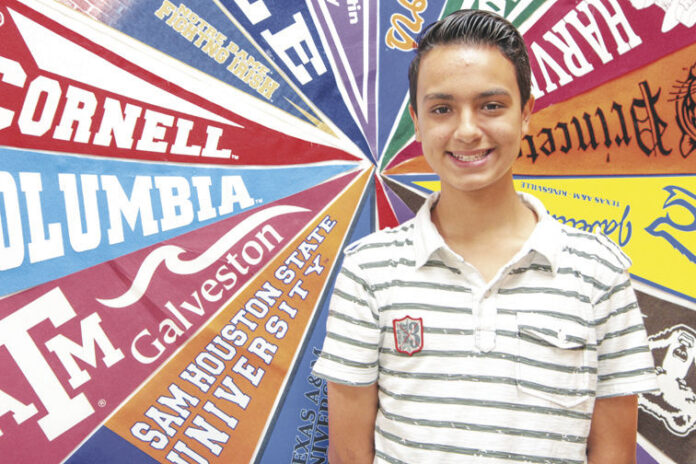SAN BENITO — Hector Martinez has a big problem.
He wants to prove the Riemann Hypothesis in time to win the $1 million prize offered by the Clay Mathematics Institute.
“No one has been able to solve it,” said Hector, 13, an eighth grader at Rising Scholars Academy of South Texas.
Hector just got a big boost for his mathematical inclinations with his acceptance into the Jack Kent Cooke Foundation’s Young Scholars Program. He’s one of 65 students across the country selected this year as Young Scholars. They were chosen from a pool of 2,000.
The Young Scholars program is a five-year pre-college scholarship. It’s designed for middle school students who are performing exceptionally well academically and have limited financial resources.
“I feel great that I actually got accepted,” said Hector of Brownsville. “It gives me a lot of benefits. You get an educational advisor and he helps you with an Individualized Learning Plan.”
The advisor, he said, will communicate with his teachers to arrange for his enrollment in advanced courses.
“The fun is that I get to be part of the program and they fund summer classes,” he said. “It’s going to be quite an experience for me because I finally get to communicate with someone with mathematical ideas.”
The program will also provide him with the technology he’ll need for his coursework.
“I did an advanced math class last summer as part of Duke TIP,” he said.
Duke University Talent Identification Program (Duke TIP) is a nonprofit organization dedicated to serving academically gifted and talented youths. They sent him a magazine with various programs, one of them being the Young Scholars Program.
“I really like math but I want to start branching out and touching other subjects,” Hector said. “So next summer I might go do something in medical. I want to keep my options open but I really have a passion for math.”
His passion for math goes back at least to the third grade when he set his sights on the Massachusetts Institute of Technology. If he hadn’t made it into the Young Scholars Program, he would find another way.
“I would probably take matters into my own hands because I really am determined to make it into MIT,” he said. “I don’t think my parents would be able to pay for it, so I do think I would have to get scholarships, and I would apply for all the scholarships that I could.”
Meanwhile, he’s got this Riemann Hypothesis to tackle. It was first published in 1859, says the WolframMathWorld website, and no one has been able to solve it.
“It’s a deep mathematical conjecture which states that the nontrivial Riemann zeta function zeros … “ Wolfram says.
Beam me up, Scotty. There’s too much intelligent life down here.





